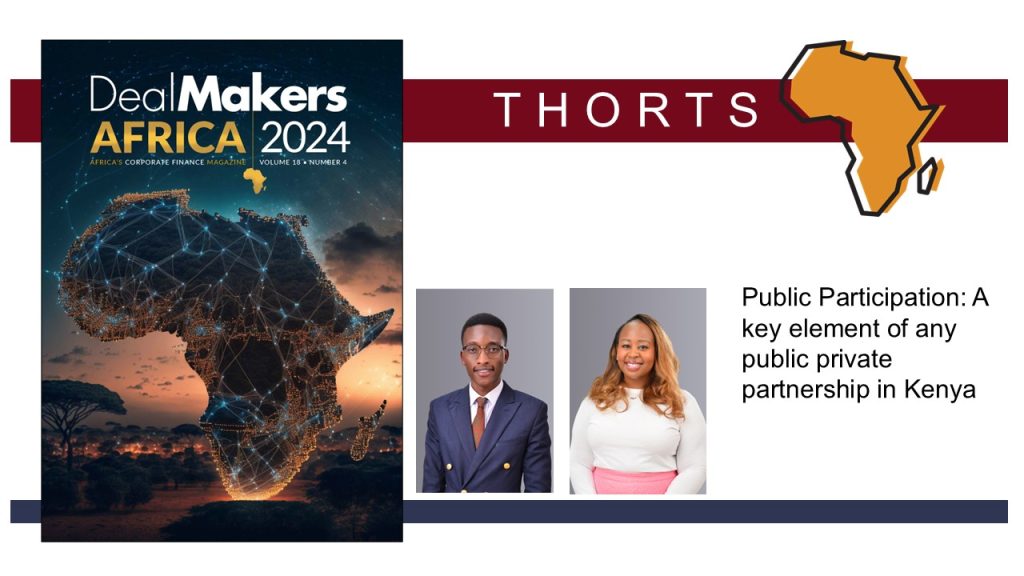How are public private partnerships (PPPs) supposed to be entered into? That was the central question that a section of the Kenyan public asked when it emerged last year that the Government had entered into a PPP with Adani Airports Holdings Limited, a subsidiary of the Adani Group, to lease Jomo Kenyatta International Airport for thirty (30) years (the JKIA Deal).
The JKIA Deal was marred by allegations of corruption and bribery, shrouded in secrecy and hurriedly executed. It was also alleged that it violated a number of laws which should guide how PPPs are entered into in Kenya.
While the matter was not determined by the courts on its legality, on 21 November 2024, President Ruto announced that he was cancelling the JKIA Deal, following the indictment in New York of Gautam Adani and his fellow executives in connection with alleged schemes to pay hundreds of millions of dollars in bribes. At the same time, the Government – through the Kenya Electricity Transmission Company (Ketraco) – announced the signing of a power PPP project allowing Adani Energy Solutions, another subsidiary of the Adani Group, to develop and operate transmission lines for thirty (30) years.
Questions have been raised with respect to how this PPP was entered into and, as court proceedings are currently ongoing, it may very well be (as you will see below) that a quashing order is imminent.
PROVISIONS OF THE LAW
Article 227 of the Constitution of Kenya, 2010 (the Constitution) provides that when a state organ or any other public entity contracts for goods or services, it shall do so in accordance with a system that is fair, equitable, transparent, competitive and cost- effective.
Additionally, Article 201 of the Constitution provides that in this process, there shall be openness and accountability, including public participation in financial matters. This requirement is to be read together with Article 10 of the Constitution, which provides that whenever implementing public policy decisions, the Government is bound by the national values and principles, including participation of the people, transparency and accountability.
PPPs under the PPP Act relate to the financing, construction, development, operation or maintenance of infrastructure or development projects.
There are different procurement methods allowed under the PPP Act, including direct procurement, privately initiated proposals (PIPs), competitive bidding, and restricted bidding. Further, the PPP Act mandates certain prequalification procedures mandatory for a contracting authority (defined as any state organ, at any level, intending to have its functions undertaken by a private entity), which include ascertaining the expertise, financial capacity, experience and due diligence checks of the private party before entering into a PPP.
Importantly, direct procurement is only allowed where the private party possesses intellectual property rights to the key approaches to the PPP, and where no reasonable alternative is available, among other reasons. Irrespective, direct procurement requires adherence to certain PPP Act procedures, including issuing a tender document and appointing an evaluation committee.
For PIPs, the PPP Act mandates that they must be subjected to due diligence to confirm that the private party is not corrupt, is not barred from PPPs in any other country, and is solvent. Additionally, PIPs are evaluated under the following four (4) criteria: public interest, project feasibility, the PPP suitability, and affordability. Under the public interest criteria, the views of the public may be sought through public participation.
Competitive bidding, another form of PPP, is more commonplace as it involves an invitation by the contracting authority of tenders, while restricted bidding is only undertaken where the following conditions have been met:
i. where, because of the complex or specialised nature of the work, contracting is restricted to prequalified tenderers;
ii. where the time to consider tenders would be disproportionate to the services;
iii. where there are few known suppliers of the services; and
iv. where an advertisement is placed on the contracting authority’s website regarding the decision to procure in this manner.
Cutting across all these procurement methods is the requirement to ensure that public participation is undertaken on a project. In Erick Okeyo -v- County Government of Kisumu & 2 Others, Petition No.1 “A” of 2014, the High Court – in considering the issue of public participation in tendering process vis PPPs – determined that the Constitution provides for citizen participation in policy formulation, planning and development; effective resources mobilisation and use for sustainable development; project identification, prioritisation, planning and implementation. Consequently, it determined that any policy decision by way of a PPP in which the citizens are not engaged in a meaningful way is constitutionally and legally indefensible.
While interpreting what amounts to effective public participation, the High Court in Robert N. Gakuru & Others v Governor Kiambu County & 3 others [2014] determined that public participation must be real and not illusory. To this end, it was held that for effective public participation to be said to have been undertaken, measures must be taken to facilitate the said public engagement over and above mere publication in government notices or media sites. Consequently, in PPPs, it is expected that the contracting authority must facilitate public engagement on the project over and above the ordinary notices in government gazettes. With respect to the JKIA Deal, this was not undertaken.
TAKE-AWAYS
As rightly identified by the African Development Bank in its PPP Strategic Framework 2021 – 2031, there are huge infrastructure gaps in African countries, especially in transport, electricity and water supply, which act as impediments to their economic growth. These gaps necessitated investment financing by the private sector to the tune of US$108 billion up until 2025. PPPs can offer a solution to increase investments and efficiencies in public infrastructure while ensuring meaningful returns, financially and socially, for impact investors on the continent.
However, lessons from Kenya show that effective public participation must be undertaken before any PPPs are considered and, therefore, contracting parties must find a way to work around confidentiality requirements in PPP agreements and input conditions precedent requiring the satisfactory completion of effective public participation that pass the muster of constitutional criticism.
Kevin Kipchirchir is an Associate and Njeri Wagacha is a Director | CDH Kenya

This article first appeared in DealMakers AFRICA, the continent’s quarterly M&A publication.
DealMakers AFRICA is a quarterly M&A publication
www.dealmakersafrica.com



